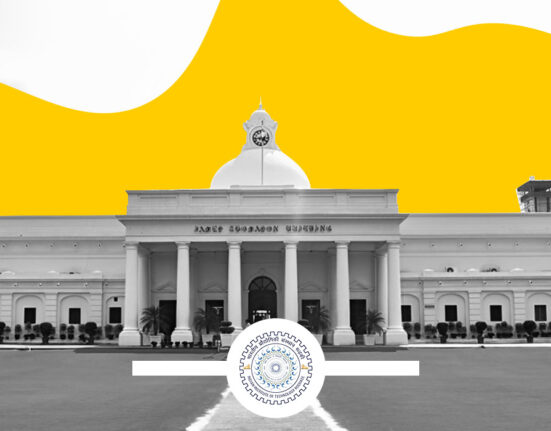The Gujarat High Court denied an appeal on Wednesday, ruling that a mentally ill person’s guardian and property manager cannot draft a will for her. A former lawyer, Vinayakrao Desai, from Vadodara, manages properties worth billions for his landlord’s daughter, Shraddha Majmudar, who was institutionalized in 1994. She was a PhD-educated educator who suffered from persistent schizophrenia. Because her relatives were allegedly antagonistic to her, the Vadodara district court assigned Desai as the manager of her holdings.
He advised that the district collector be given the duty, but the officer was hesitant. The court’s judgment was contested by her kin, but the high court confirmed Desai’s appointment order in 2015. The woman died in January 2018, at the age of 76.
Desai established the Shraddhanjali Manochikitsa Trust to help people with mental illnesses. He intended to utilize her properties for this purpose, so he drafted a will on her behalf in 2016 to fund the trust’s activities using her assets. He applied to the court for probate of the will, which he had made as the manager of a mentally ill person. However, both the district court and a single judge of the high court rejected his claim that as manager, he could draft a will on her behalf.
Also Read: Understanding the Overlap in Mental Illnesses
Section 59
Desai had to approach the High Court, which denied his application in 2018 citing Section 59 of the Succession Act, which bans a mentally ill individual from creating a will.
A single judge noted that a will represents a deliberate decision made by an individual regarding their possessions after death, but this awareness is absent in a mentally ill individual. “How can a property manager write a will in her name that expresses her wishes to be carried out after her death? Because the very intention, which is the soul of the Will, cannot be discovered in the document of Will made by the manager in the name of the mentally ill person, it cannot be claimed to be the Will of the mentally ill person in the eyes of the law.”, said the court.
Rights of Persons with Mental Illness
1. The Central or State Governments must build the necessary number of halfway homes, sheltered accommodations, and supported accommodations
Supported accommodations for those with mental illnesses may be provided at any location considered appropriate, taking into account the following.
- (a) Facility workload;
- (b) Existing mental health facilities in the state;
- (c) Number of people suffering from mental illnesses in the state.
- (d) the geographical and climatic parameters of the proposed facility location.
2. Half-way houses, sheltered accommodations, and supported accommodations created by the Central Government, State Government, local authority, trust (private or public), corporation, cooperative society, organization, or other body.
Individuals must adhere to the minimum requirements set by the Authority (9) of section 180r sub-section (6) of section 65, as applicable.
Also Read: Does mental illness affect economic development?
3. The Central or State Governments will create the necessary number of hospital and community-based rehabilitation institutes for providing rehabilitation treatments required by individuals with mental illness.
(2) Hospitals and community-based rehabilitation institutes created by the Central Government, State Government, local authority, trust (private or public), business, cooperative society, organization, or any other entity or person should follow the minimum standards prescribed by the Authority under sub-section (9) of section 18 or sub-section (6) of section 65, as applicable. (5) Reimbursement for intermediary expenses of treatment at mental health establishments. – (1) Until services under sub-section (5) of section 18 are made accessible in a health establishment established or sponsored by the State Government.
Individuals with mental illnesses can seek reimbursement for treatment costs at a mental health establishment by applying to the Chief Medical Officer in their area. (2)The Chief Medical Officer will review the application for reimbursement of treatment costs from the person referred to in sub-rule (1) and issue an order to pay the costs by the officer in charge.
The State Government’s Directorate of Health Services must limit reimbursement costs to the rates set by the Central Government periodically.
4. Right to access basic medical records.
- (1) A person with a mental illness has the right to receive documented medical information regarding his or her diagnosis, examination, evaluation, and treatment in accordance with the medical record.
- (2) A person with a mental illness may request a copy of his or her basic medical records by making a written request on Form A to the medical officer or psychiatrist responsible for the mental health care in question.
can do. - (1) The basic inpatient medical records in Form B shall be provided to the applicant within 15 days of her receipt of the application under sub-regulation (2).
- (4) Determining whether the mental health professional or facility will disclose information or provide basic inpatient medical records or other records related to ethical, legal, or other sensitive issues to the applicant. If not, you can apply to the Mental Health Review Board to state the relevant issues and its opinion on the matter and to seek directions in the form of a written order.
- (5)After hearing the person suffering from a mental illness, the board must issue an order to a psychiatric professional or mental health facility if it determines that such direction is appropriate.
5. Custodial institutions
Persons in charge of prisons, police stations, orphanages, women’s shelters, nursing homes, and other government-run facilities, as well as municipal governments, trusts, companies, cooperatives, organizations, and other private or public groups or persons.
If the person supervises the occupant and does not permit them to leave the house without permission, they must display a sign with their or others’ information in a prominent location. Individual residents cannot leave without their approval and must display signage in English, Hindi, and local languages.
Also Read: Study: Magicians are less likely to get mental illness
Inform individuals with mental illnesses or their representatives that they are eligible for free legal services under certain conditions. Legal Services Authorities must comply with appropriate laws and court orders, including providing contact information for available services.
References+
Tnn. (2024, March 14). A guardian can’t make a mentally ill person’s will. The Times of India. https://timesofindia.indiatimes.com/city/ahmedabad/gujarat-high-court-rules-guardian-and-manager-cannot-make-mentally-ill-persons-will/articleshow/108476628.cms
Tnn. (2024, March 14). Guardian can’t make mentally ill person’s will. The Times of India. https://timesofindia.indiatimes.com/city/ahmedabad/gujarat-high-court-rules-guardian-and-manager-cannot-make-mentally-ill-persons-will/articleshow/108476628.cms













Leave feedback about this